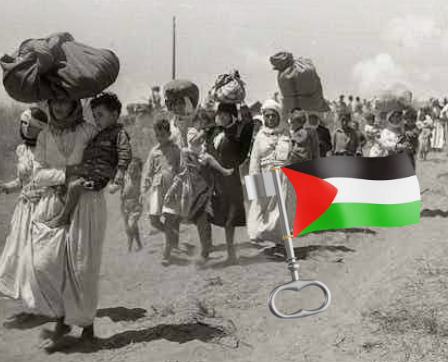On May 15, 2025, Palestinians and supporters worldwide mark the 77th anniversary of the Nakba (Arabic for “catastrophe”). The Nakba refers to the mass displacement, dispossession, and destruction experienced by the Palestinian people during the creation of the State of Israel in 1948. This event forced more than 950,000 Palestinians from their homes, leading to a refugee crisis and decades of suffering, conflict, and struggle for justice.
The Nakba remains a defining tragedy in Palestinian history and continues to impact millions of Palestinians today — socially, politically, and economically.
Historical Background: The Events of 1948
-
Prior to 1948, approximately 1.4 million Palestinians lived in historic Palestine, a land rich in diverse communities, cultures, and traditions.
-
The 1948 Arab-Israeli war and associated Zionist military campaigns led to the forcible expulsion of nearly 957,000 Palestinians, more than two-thirds of the indigenous population.
-
Over 531 Palestinian villages and towns were completely destroyed or depopulated to make way for new Israeli settlements.
-
During this period, over 15,000 Palestinians were massacred in violent attacks, including infamous massacres in places like Deir Yassin.
-
Many Palestinians fled to neighboring countries such as Lebanon, Jordan, Syria, and Gaza, where refugee camps were established.
The Palestinian Refugee Crisis: Then and Now
The Nakba created one of the largest and longest-standing refugee crises in modern history:
-
Today, the United Nations Relief and Works Agency (UNRWA) estimates over 15.2 million Palestinians worldwide, including descendants of those displaced in 1948.
-
More than 50% of Palestinians live outside historic Palestine, mainly in refugee camps in the Middle East.
-
Inside historic Palestine (Israel, West Bank, and Gaza), approximately 7.4 million Palestinians reside alongside an almost equal number of Israeli citizens.
-
Despite decades of displacement, the right of return for Palestinian refugees remains a central, unresolved issue in peace negotiations.
Current Realities: Occupation, Displacement, and Human Rights Violations
The legacy of the Nakba continues in the form of ongoing occupation and violations of Palestinian rights:
Israeli Occupation and Settlement Expansion
-
The West Bank and East Jerusalem remain under Israeli military occupation, with over 770,000 Israeli settlers living in more than 150 settlements and approximately 250 outposts.
-
In 2024, Israel confiscated over 46,000 dunums (approximately 11,400 acres) of Palestinian land for settlements, outposts, and military use.
-
Israeli authorities issued more than 1,500 demolition orders targeting Palestinian homes and structures, leading to thousands being displaced.
-
Settlement expansion continues to fragment Palestinian communities, restricting their movement and access to resources.
Humanitarian Crisis in Gaza
-
Gaza remains under an Israeli blockade, severely restricting goods, services, and movement.
-
Since October 2023, relentless Israeli bombardment in Gaza displaced more than 2 million Palestinians, representing nearly 80% of Gaza’s population.
-
Over 68,900 buildings have been destroyed or severely damaged in Gaza, including homes, hospitals, and schools.
-
Basic necessities such as food, clean water, electricity, and medical supplies are in critical shortage, exacerbating the humanitarian crisis.
-
More than 1,400 children have been killed or injured during the ongoing conflict, with countless others suffering trauma.
Violence and Land Destruction in the West Bank
-
In 2024, more than 16,600 incidents of settler and military violence targeted Palestinian homes, farmland, and religious sites.
-
Over 14,000 Palestinian-owned trees were uprooted or destroyed, including thousands of olive trees which are culturally and economically vital.
-
Movement restrictions, including checkpoints and roadblocks, severely limit Palestinians’ freedom to access jobs, healthcare, and education.
-
Israeli military raids, arrests, and administrative detentions remain common, disrupting Palestinian daily life and contributing to a climate of fear.
The Global Significance of the Nakba
The Nakba is not only a Palestinian tragedy; it symbolizes the struggle for self-determination, human rights, and justice worldwide:
-
It highlights the urgent need for a just and lasting solution to the Israeli-Palestinian conflict based on international law.
-
The international community continues to debate issues such as Palestinian statehood, refugees’ rights, and the end of occupation.
-
The Nakba’s legacy informs discussions on ethnic cleansing, displacement, and settler colonialism globally.
-
Commemorating the Nakba raises awareness of Palestinian history, culture, and resilience despite decades of adversity.
A Call to Remember and Act
On the 77th anniversary of the Nakba, May 15, 2025, it is crucial to:
-
Recognize the profound impact of the Nakba on millions of Palestinians past and present.
-
Support Palestinian rights, including the right of return, freedom from occupation, and access to humanitarian aid.
-
Advocate for peaceful solutions and respect for international law.
-
Promote global solidarity with Palestinians as they continue to seek justice, dignity, and peace.
The Nakba remains an open wound in the history of the Middle East, reminding us that peace cannot be achieved without addressing historical injustices.
Related stories:
Danny Jin: The Japanese-Palestinian Rapper Fighting for Palestine Through Music
European Nations Norway, Ireland, and Spain to Recognize Palestine states from May 28th
















